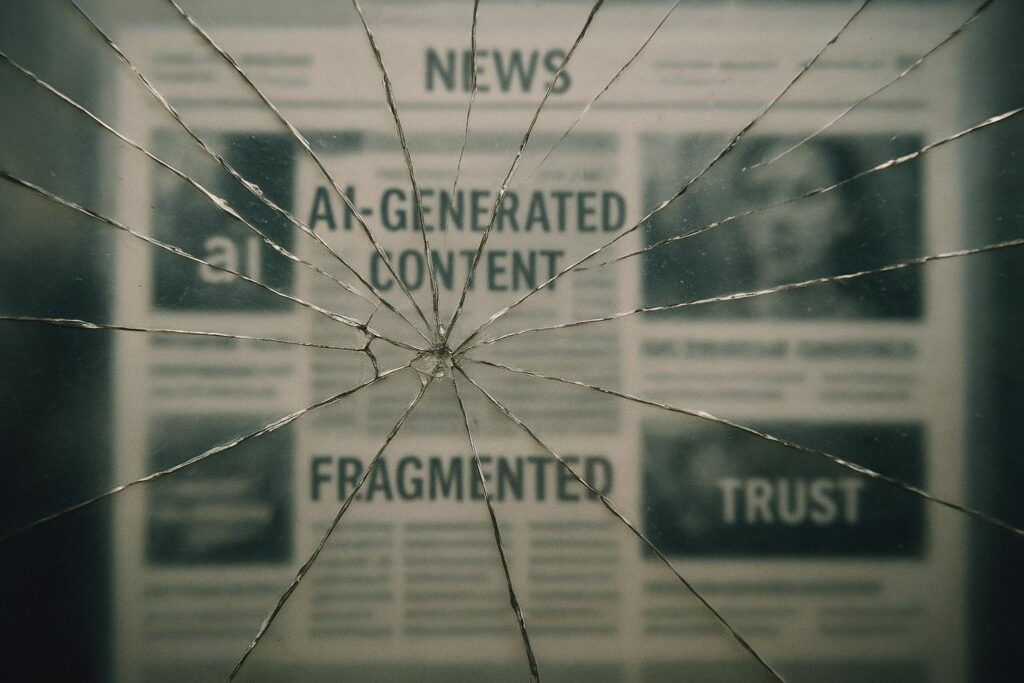- Reuters Institute reports usage of AI tools in news has doubled in a year, now at 34% weekly
- Most people distrust AI-generated news, favouring human journalists
- Transparency about AI’s role in journalism is crucial for maintaining trust
Public use of generative AI tools has doubled in the past year, but most people remain uncomfortable with the idea of artificial intelligence creating news, according to a new report from the Reuters Institute for the Study of Journalism.
The 2025 Generative AI and News report, based on surveys in six countries, finds that while awareness of generative AI is now nearly universal, people continue to express deep reservations about its use in reporting and storytelling. Weekly use of AI tools has risen from 18 percent in 2024 to 34 percent this year, with much of the growth coming from AI features embedded in search engines and productivity software rather than standalone platforms.
The report notes a clear divide between how people use AI and how they feel about it. Many turn to generative AI for information, creative support and learning, but only a small minority are comfortable with AI-generated news. Just 12 percent of respondents said they were comfortable with news made entirely by AI, rising to 21 percent when a human editor was involved. Nearly two-thirds preferred news produced solely by journalists.
People are more accepting of AI being used behind the scenes for editing, translation or formatting, but far more cautious about its use in creating text, images or presenters that appear human. While some see benefits in speed, efficiency and accessibility, many worry about transparency, misinformation and the potential loss of human judgment.
The report suggests that news organisations face a difficult balancing act as they adopt AI tools to improve production and engagement while trying to maintain audience trust. It warns that concealing the role of AI could damage credibility, and that openness about how technology is used will be essential to preserving confidence in journalism.
- https://www.reuters.com/info-pages/reuters-and-ai/ – This page details Reuters’ use of generative AI in various aspects of their news process, including reporting, writing, editing, production, and publishing, and their commitment to transparency when AI is involved in content creation.
- https://www.reuters.com/technology/artificial-intelligence/global-audiences-suspicious-ai-powered-newsrooms-report-finds-2024-06-16/ – This article discusses global concerns about AI in news production and misinformation, highlighting that a significant number of respondents, especially in the US and UK, are uncomfortable with news generated by AI, particularly for sensitive topics like politics.
- https://www.reuters.com/technology/artificial-intelligence/ai-chatbots-are-emerging-as-a-source-of-news-according-to-our-digital-news-report-2025-2025-10-03/ – This report highlights that AI chatbots are emerging as a source of news, with 7% of people using chatbots for news, and 12% among those under 35, indicating a growing role of AI in news consumption.
- https://www.reuters.com/business/imfs-georgieva-says-countries-lack-regulatory-ethical-foundation-ai-2025-10-13/ – This article reports on IMF Managing Director Kristalina Georgieva’s warning that countries globally lack the necessary regulatory and ethical frameworks to manage the rapid growth of artificial intelligence, emphasizing the need for policy action.
- https://www.reuters.com/technology/artificial-intelligence/ai-generated-content-raises-risks-more-bank-runs-uk-study-shows-2025-02-14/ – This study highlights the increased risk of bank runs due to AI-generated disinformation spread on social media, urging banks to enhance media and social media monitoring to identify and mitigate the impact of disinformation.
- https://www.reuters.com/business/un-report-urges-stronger-measures-detect-ai-driven-deepfakes-2025-07-11/ – This United Nations report calls for stronger global measures to detect and counter deepfake content, emphasizing the risks posed by AI-generated multimedia and recommending digital verification tools across content platforms.


